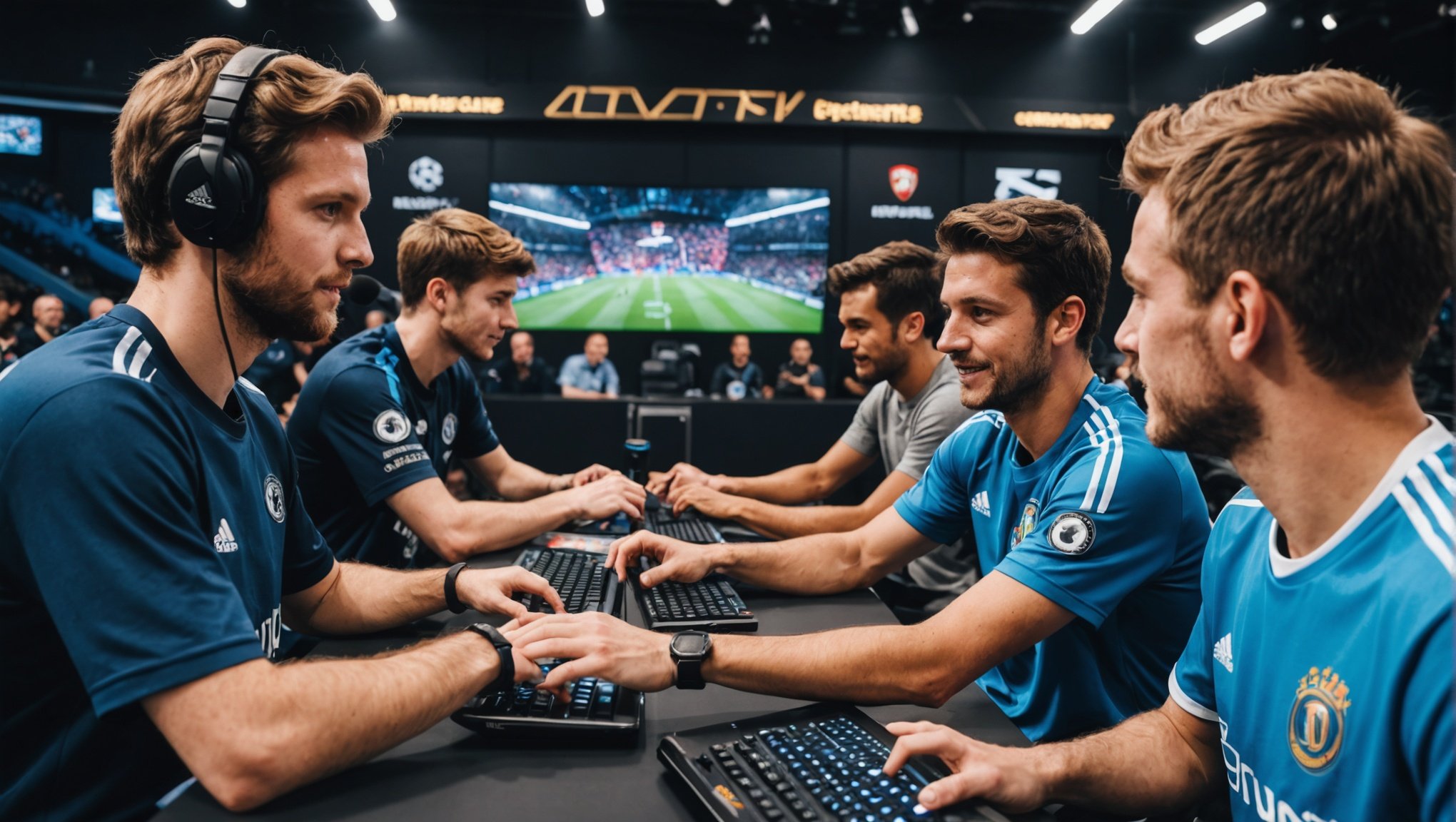Unlocking New Fan Engagement: Leveraging eSports for Football Clubs to Connect with Younger Audiences
In the ever-evolving sports industry, football clubs are facing a new challenge: how to engage with a younger generation of fans who are increasingly drawn to digital and interactive experiences. One of the most promising strategies to address this is by leveraging eSports, a sector that has exploded in popularity over the past decade. Here’s a deep dive into how football clubs can use eSports to connect with younger audiences and enhance fan engagement.
The Rise of eSports and Its Appeal to Younger Audiences
eSports has transformed from a niche hobby into a global phenomenon, attracting millions of young fans worldwide. The appeal of eSports lies in its interactive nature, real-time competition, and the ability to connect with others through shared interests.
Also to see : Empowering Local Communities: Strategies for Football Clubs to Foster Community Engagement and Development
- Interactive Experiences: eSports offers a highly engaging and interactive way for fans to participate in sports, whether through watching professional gamers compete or by playing games themselves. This interactivity is a key factor in its appeal to younger audiences who are accustomed to dynamic and immersive digital experiences[5].
- Community Building: eSports fosters a strong sense of community among fans. Platforms like Twitch and YouTube allow fans to watch live streams, interact with other viewers, and engage with professional gamers. This community aspect is crucial for building a loyal fan base.
- Real-Time Engagement: eSports events are often broadcast in real time, providing an immediate and thrilling experience for viewers. This real-time engagement is something traditional sports can also learn from, as seen in the partnership between Borussia Dortmund and WSC Sports, which uses AI to create and distribute video content in real time[1].
Integrating eSports into Football Club Strategies
Football clubs are beginning to recognize the potential of eSports in enhancing fan engagement and reaching younger audiences. Here are some ways clubs can integrate eSports into their strategies:
Creating eSports Teams and Competitions
Many football clubs have already established their own eSports teams, competing in various gaming tournaments. For example, Juventus launched its own eSports team, which competes in FIFA and other gaming competitions. This move helps the club connect with a new demographic of fans who are passionate about both football and gaming.
Also read : Unlocking Player Potential: Harnessing Machine Learning for Predicting Football Performance
- Competitive Gaming: By participating in eSports competitions, football clubs can tap into the existing fan base of gamers. This not only expands their reach but also provides a new avenue for fan engagement.
- Brand Extension: Creating an eSports team allows clubs to extend their brand into a new domain, leveraging the popularity of video games to attract younger fans.
Utilizing Gaming Platforms for Content Distribution
Gaming platforms and social media are crucial for distributing content and engaging with fans. Here’s how football clubs can use these platforms effectively:
- Social Media Integration: Clubs can use social media platforms like Twitter, Instagram, and TikTok to share eSports-related content, such as highlights from gaming tournaments or behind-the-scenes looks at their eSports teams. This helps in creating a more personalized and engaging fan experience[2].
- Live Streaming: Platforms like Twitch and YouTube Live can be used to broadcast eSports events, allowing fans to watch and interact with the content in real time.
Collaborating with Gaming Companies and Influencers
Collaborations with gaming companies and influencers can help football clubs tap into the vast audience of gamers.
- Partnerships with Gaming Companies: For instance, Disney’s partnership with Riot Games to create “ESPN Football Island” in Fortnite is a prime example of how sports brands can collaborate with gaming companies to reach new audiences[5].
- Influencer Marketing: Partnering with gaming influencers can help clubs promote their eSports initiatives and reach a broader audience. These influencers often have millions of followers and can significantly boost the visibility of the club’s eSports endeavors.
Enhancing Fan Experience Through eSports
eSports offers a multitude of ways to enhance the fan experience, making it more engaging and interactive.
Augmented Reality and Game Mechanics
- Augmented Reality: Integrating augmented reality (AR) into the fan experience can make it more immersive. For example, AR overlays can provide real-time statistics and replays during live matches, enhancing the viewing experience[4].
- Game Mechanics: Incorporating game mechanics into traditional sports can make the experience more engaging. For instance, fantasy football leagues and prediction games can encourage fans to participate more actively.
Virtual Events and Meet-and-Greets
Virtual events and meet-and-greets are becoming increasingly popular, especially among overseas fans who cannot attend physical matches.
- Virtual Meet-and-Greets: Clubs can organize virtual meet-and-greets with players, which can be a significant draw for fans. According to Chiliz’s Global Fan Report, 22% of fans are interested in virtual meet-and-greets with players[2].
- Virtual Training Ground Access: Providing virtual access to training sessions can give fans a unique behind-the-scenes look, further enhancing their engagement with the club.
Practical Insights and Actionable Advice
Here are some practical insights and actionable advice for football clubs looking to leverage eSports for fan engagement:
Understand Your Audience
- Demographic Analysis: Conduct thorough demographic analysis to understand the preferences and behaviors of your target audience. For example, the Chiliz report highlights that 79% of soccer fans believe digital platforms significantly enhance their fan experience[2].
Invest in Digital Infrastructure
- AI-Powered Content: Invest in AI-powered content creation tools, like those used by Borussia Dortmund with WSC Sports, to automate and personalize content distribution[1].
- Social Media Presence: Maintain a strong social media presence and regularly update your content to keep fans engaged.
Collaborate with Other Sports Organisations
- Cross-Promotion: Collaborate with other sports organisations and gaming companies to cross-promote each other’s content and events. This can help in reaching a broader audience.
Case Studies and Examples
Here are some case studies and examples that illustrate the successful integration of eSports into football club strategies:
Borussia Dortmund and WSC Sports
Borussia Dortmund’s partnership with WSC Sports is a prime example of how AI-powered content can enhance fan engagement. WSC Sports’ platform automates the creation, management, and distribution of video content, allowing Dortmund to connect more consistently with its global fan base. This includes analyzing live matches and creating content in real time, as well as repurposing historical match footage into various formats to fit different platforms[1].
Juventus and Team Jay
Juventus’s animated series, Team Jay, is another innovative approach to engaging younger audiences. The series, which targets children aged 6-10, focuses on topics like mental health and environmental issues, while also incorporating soccer skills. This initiative helps Juventus connect with a new generation of fans through a medium they are familiar with and enjoy[5].
Table: Comparing Traditional Sports and eSports Engagement Strategies
| Engagement Strategy | Traditional Sports | eSports |
|---|---|---|
| Content Distribution | Primarily through TV and radio | Social media, live streaming platforms |
| Interactive Elements | Limited to live match attendance | Real-time engagement, game mechanics, AR overlays |
| Community Building | Stadium events, fan clubs | Online communities, forums, live chat during streams |
| Demographic Reach | Older demographics | Younger demographics, global reach |
| Revenue Streams | Ticket sales, merchandise, sponsorships | Sponsorships, advertising, subscription models |
| Fan Participation | Limited to watching matches | Participating in fantasy leagues, prediction games, playing video games |
Quotes from Industry Experts
- Aviv Arnon, Chief Business Development Officer and Co-Founder, WSC Sports:
“It’s a thrill to partner with a club of BVB’s stature who have one of the most passionate and recognisable fan bases across all sports. WSC Sports is a proven formula for expanding reach, growing fandom, and unlocking revenue opportunities across platforms and we are excited to realise this opportunity with BVB.”[1] - Alexander Dreyfus, Founder & CEO at Chiliz:
“As soccer continues to evolve, understanding and engaging with the global fanbase will be crucial for clubs looking to maintain and grow their international appeal. The passion of soccer fans knows no boundaries, and this research shows that clubs, especially those in the Premier League, must continue to innovate in how they engage with their global fanbase.”[2] - Jennifer Burgos-Watkinson, Founder of Eclipse Productions:
“Ultimately, there are some areas where there is overlap [with the football club], but otherwise it is about talking to new audiences. These are all future-proofing tools. It is about growing touchpoints but not to sell tickets [to soccer games].”[5]
Leveraging eSports is a strategic move for football clubs aiming to connect with younger audiences and enhance fan engagement. By integrating eSports into their content distribution, community building, and revenue generation strategies, clubs can tap into the vast and engaged audience of gamers. As the sports industry continues to evolve, embracing eSports and digital technologies will be crucial for maintaining and growing a global fan base.
In conclusion, the future of fan engagement in football is not just about the game itself, but about creating a holistic experience that includes interactive content, virtual events, and community engagement. By embracing eSports and the digital landscape, football clubs can ensure they remain relevant and appealing to the next generation of sports fans.










